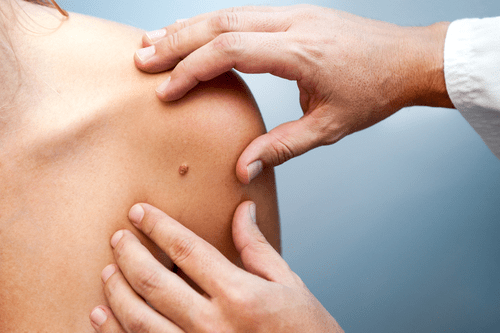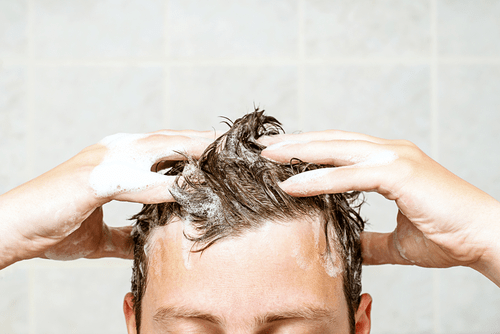- About
- Services
- Patient Information
- Specials
- Shop
- Locations
- Contact Us
A flaky, itchy scalp could be a sign of dandruff or dry scalp. What many people refer to as “dry skin” or dandruff in the scalp is actually in inflamed skin.
Inflammation causes increased turn over of skin cells which slough off giving the appearance of dry skin. This is commonly seen in seborrheic dermatitis or simply, seborrhea. This skin condition is characterized by yellow greasy scales of skin with more than usual redness. It occurs over the scalp, eyebrows, the folds around the nose, and the ears. It can also occur in areas of facial hair.
We believe this condition is at least partly due to a naturally occurring fungus on the skin, which induced inflammation. Why only some people get it is unclear. According to WebMD, these are some of the common reasons your scalp can get dry and itchy:
Seborrheic dermatitis (or seborrhea): This common skin condition causes redness, itching, and flaking. It can occur on many parts of the body. When it affects the scalp, it’s called dandruff. It’s treatable. Most often, over-the-counter medicated shampoos will stop the flakes from falling. More stubborn cases will likely benefit from prescription-strength shampoos and steroid creams.
Scalp psoriasis can cause dandruff-like itching and flaking. Psoriasishappens when the immune system triggers too many skin cells to grow on various parts of the body. That can include your scalp. People with psoriasis may be more likely to get dandruff, but psoriasis is not dandruff.
Eczema. This skin condition can make your scalp itchy and flaky. It’s most common in babies and children, but anyone can get it. The cause is unknown. Moisturizers and prescription steroid creams can help relieve the symptoms, as can avoiding harsh soaps and scratching. It also helps to avoid stress whenever possible.
No. Early non-melanoma skin cancers on the scalp may appear to people as “dry skin.” Other indications that you may have a skin cancer on the scalp is a spot that comes and goes over time, possibly bleeding on occasion, and even causing itchiness or pain. People at great risk for having skin cancers on there scalp are those that live in Arizona, having jobs or hobbies exposing them to sun radiation, age over 40, Caucasian or lighter-tones skin -to name some of the important ones.

These skin cancers on the scalp, like skin cancers anywhere else, may be locally destructive or less commonly spread to other parts of the body which is potentially fatal. This is why we stress the importance of having skin checks by a dermatologist. Fortunately, the vast majority of the skin cancers we see are detected early and can be successfully treated with a simple surgery.
It is treated most commonly with over-the-counter shampoos that have the following ingredients: coal tar, selenium sulfide (brand name is Selsun Blue), zinc pyrithione (brand name is Head and Shoulders), ketokonazole (brand name is Nizoral).

Importantly, these medicines do not cure the condition, instead they control it. People with this condition usually have this condition for life and they experience relapsing and remitting symptoms. Many people will require using these products daily whereas some may only require using them 1-2 per week. Furthermore, some people will require a visit to the dermatologist to obtain a more sophisticated prescription regiment for control of their seborhea and/or to address whether another type of skin condition is occurring.
According to Mayo Clinic, if you have dandruff it can almost always be controlled, but dandruff treatment may take some trial and error. In general, daily cleansing with a gentle shampoo to reduce oiliness and skin cell buildup can often help mild dandruff.
When regular shampoos fail, dandruff shampoos you can buy at a drugstore may succeed. But dandruff shampoos aren’t all alike, and you may need to experiment until you find one that works for you.
If you develop itching, stinging, redness or burning from any product, stop using it. If you develop an allergic reaction — such as a rash, hives or difficulty breathing — seek immediate medical attention.
In addition to regular shampooing, you can take steps to reduce your risk of developing dandruff:
In conclusion, “dry skin” is actually just inflammation typically caused by seborrhea but also could be caused by other skin conditions, as well as skin cancer. We advise using over-the-counter shampoos to treat the seborrhea. However, if you can not successfully control the condition with these products, then it’s time to visit the dermatology office.
Skin cancers can appear as dry areas of skin over the scalp and if you are concerned for a skin cancer or if you have some of the risk factors for skin cancers as stated above, then we recommend you visit the dermatologist for evaluation.
Contact Affiliated Dermatology today!
— Andrew Newman, DO | Affiliated Dermatology | Resident Tips
A full-service dermatology group offering services in general dermatology, skin cancer detection and treatment, Mohs surgery, aesthetics, and allergy. At our Valley-wide locations, we take pride in our dedication to help inspire and empower you to make educated, healthy decisions about skin care.
Follow Us Online:
 Scroll Up
Scroll Up